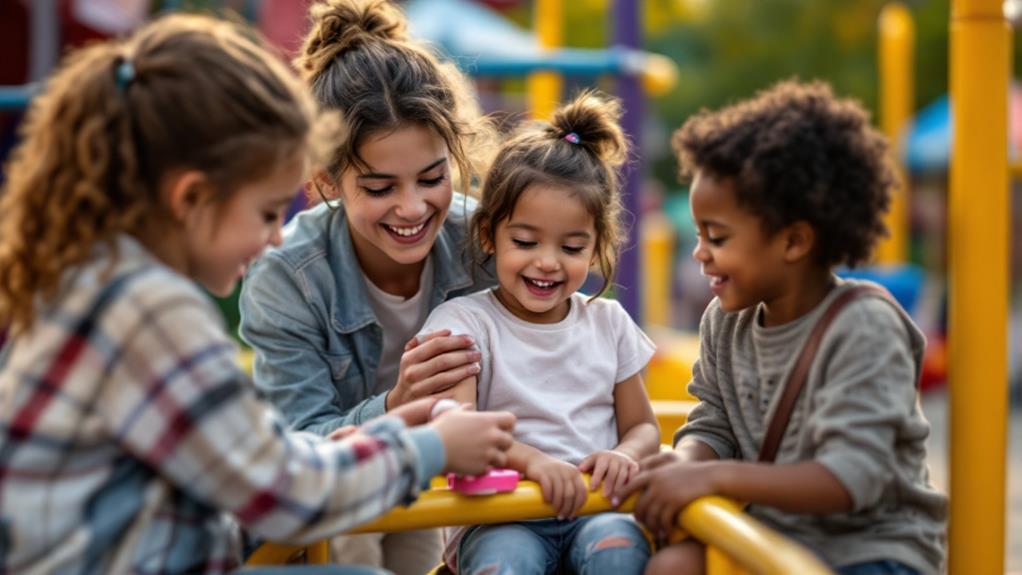How Random Acts of Kindness Help Foster Empathy in Children

Random acts of kindness help cultivate empathy in children by providing hands-on experiences that develop emotional awareness and viewpoint-taking skills. When you engage your child in kind behaviors, you're giving them opportunities to recognize others' feelings and needs. These acts activate the brain's reward centers, reinforcing positive emotions and encouraging further compassionate actions. By modeling kindness and discussing its impact, you're helping your child build stronger social connections and develop a lifelong empathetic mindset. Incorporating small acts of kindness into daily routines can create a powerful ripple effect, inspiring more goodwill and cultivating a culture of compassion that extends far beyond your family.
Understanding Empathy Through Action
Empathy, a fundamental human trait, can be nurtured in children through active engagement in kind deeds. You'll be surprised to learn that even babies as young as 9 months old show a preference for kind behaviors, indicating an innate capacity for compassion. To build on this natural inclination, you can help children understand empathy by encouraging them to participate in simple acts of kindness.
When you involve kids in small acts of generosity, like baking cookies for first responders or creating cards for nursing home residents, you're providing them with opportunities to view from another angle. These experiences activate the brain's reward centers, reinforcing positive feelings associated with compassionate behavior. As you model kind actions and discuss the emotional impact on recipients, you're helping children develop a deeper understanding of empathy.
Cultivating Compassion in Daily Life
Building on the foundation of understanding empathy through action, it's important to weave compassionate behaviors into everyday life. You can encourage kindness in your children by incorporating small acts of kindness into your family's daily routines. Consider making kindness cards or donating used books together, which helps cultivate compassion and empathy in a tangible way.
To reinforce the importance of being caring and considerate, discuss how these acts impact others and the positive emotions they create. This approach helps your children develop a deeper understanding of empathy and compassion. Remember, you play a pivotal role in shaping your child's values and learning through your own actions. By displaying compassion and kindness yourself, you're setting a powerful example that will have a lasting impact on your child's development of empathy.
Research shows that children as young as 9 months old naturally gravitate towards kind behaviors in others. You can nurture this innate tendency by regularly pointing out the feelings of others and practicing empathetic interactions. This strengthens the part of the brain responsible for empathetic thinking, helping your children develop strong foundations for kindness and empathy throughout their lives.
The Ripple Effect of Kindness
Numerous studies have shown that kindness creates a powerful ripple effect in society. When you perform a small act of kindness, you're not just affecting the recipient; you're potentially inspiring a chain reaction of goodwill. Research indicates that kindness is contagious, with one act often sparking multiple additional acts from others.
You'll find that even a child's small gesture can have far-reaching consequences. When someone else's child witnesses an act of kindness, it activates the part of their brain associated with feeling happy. This positive experience motivates them to want to pay it forward, creating a cycle of compassion. One day, that child might help another person, further extending the ripple effect.
To maximize the impact of kindness, consider concentrating your efforts. A study of college students found that performing five acts of kindness in a single day led to a greater increase in happiness compared to spreading them over a week. By consistently modeling and encouraging kindness, you can help make it an ingrained part of a child's character and behavior, cultivating empathy that lasts a lifetime.
Recognizing Others' Emotions and Needs
You might be surprised to learn that even babies as young as 9 months old can recognize kindness in others. This innate capacity for empathy can be nurtured and developed as children grow. By engaging in simple acts of kindness and encouraging your children to do something nice for someone, you're helping them recognize others' emotions and needs.
To develop empathy, make a habit of pointing out feelings in various situations. When you perform random acts of kindness, discuss how the recipient might feel and why. Encourage your children to be "emotion detectives" by identifying characters' feelings in books or movies. This practice strengthens the brain's empathetic thinking centers and improves emotional awareness.
Understanding one's own emotions is equally important. Validate your children's feelings and help them express themselves clearly. This foundation of emotional well-being enables them to better recognize and respond to others' needs. By incorporating these strategies into daily life, you're not only teaching your children to perform acts of kindness but also helping them develop empathy, a vital skill for navigating social interactions and building meaningful relationships throughout their lives.
Building Stronger Social Connections

Friendships and social bonds are essential for a child's development, and random acts of kindness can be a powerful tool for strengthening these connections. When your child performs a small act of kindness, they're not only helping others but also building a sense of connection with their peers and community.
Encouraging your child to show kindness from an early age can lead to meaningful life skills and improved social competence. Research demonstrates that children who engage in kind behaviors experience increased feelings of belonging and develop stronger relationships with their peers. By participating in community service or helping family members, your child can enhance their self-esteem and overall life satisfaction.
You can reinforce these positive behaviors by praising your child's acts of kindness, which helps them understand the social benefits of empathy and compassion. As they continue to practice kindness, they'll likely experience decreased loneliness and form more meaningful connections with others. By cultivating a culture of kindness in your home and community, you're helping your child build the foundation for strong, empathetic relationships that will serve them well throughout their lives.
Developing a Lifelong Empathetic Mindset
While building social connections through kindness is important, cultivating an enduring empathetic mindset in children is equally precious. You can start this process early, as studies show that even 9-month-old infants prefer helpful actions over harmful ones. To develop a lifelong empathetic mindset, regularly point out others' emotions and model empathetic responses. This simple yet effective practice strengthens the part of the brain responsible for empathetic thinking.
Encourage your children to perform random acts of kindness, from simple tasks like helping a classmate to showing kindness toward less fortunate individuals. These small gestures significantly enhance their capacity for compassion and emotional intelligence. Incorporate kindness-focused activities into their daily routine, such as discussing ways to help others overcome life's challenges. By consistently exposing children to kind behaviors and providing opportunities to practice empathy, you're laying the foundation for a lifetime of compassion. Remember, developing an empathetic mindset is an ongoing process that requires patience and persistence. Your efforts will help shape your child into a more understanding, compassionate individual who's better equipped to manage the intricacies of human relationships.




